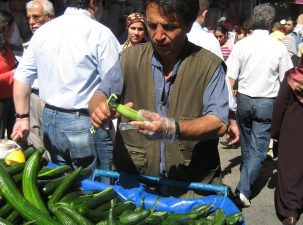
Gulf states urge citizens not to visit Lebanon, cancelations abound
Despite appeals from Lebanese leaders, Gulf states are advising their citizens not to travel to Lebanon and those already there to leave, thus boding ill for this summer’s tourism industry. Beirut, once known as the Riviera of the Levant, has thrived through turmoil as a place where visitors from the oil-rich states like to spend their summers and a few billion dollars on everything from renting luxurious apartments on the waterfront, to fancy cars, restaurants, clubs and hotels.
But current political turmoil and security developments in Lebanon have forced many Gulf Arabs to cancel their summer bookings or put them off until the situation in the country stabilizes.
On top of that, Beirut has now replaced Abu Dhabi as the most expensive city in the Middle East, according to the new Mercer’s 2012 Worldwide Cost of Living Survey released last week.
To make matters worse, swaths of the country including Beirut, Tripoli and Sidon plunged into darkness as one of the country’s major electric power plants broke down this week. The perpetual electricity crisis caused tempers to boil over this time and protestors blocked main highways across the country with burning tires.
And to add pain to misery, Foreign Policy released a study Monday saying Lebanon was “one of the least stable states in the world.” The country was ranked 45 on the list of most failed states in the world, which is better than the 18th position it received in 2008, but not yet up to its post-2006 war level of 65.
The index ranked countries around the world by their potential for failure based on 12 indicators of state stability, including human flight, security apparatus, and public services.
The Lebanese Ministry of Tourism advertises the country as the “land of golden beaches and stunning mountain landscapes.” That may be, but their Internet page hasn’t been updated since last year. Still, last week they launched a media blitz on international television stations to promote Lebanon.
The UAE, Kuwait, Qatar and Bahrain, citing security concerns, have urged their citizens to avoid travel to Lebanon, where clashes linked to the conflict in neighboring Syria have left several people dead in recent weeks. Emiratis who were currently in Lebanon were also advised to leave.
Evidence of the rebellion in Syria spilling over into Lebanon was again seen this weekend when gun battles broke out between the predominantly Sunni neighborhood of Bab Al-Tabbaneh and the majority Alawite neighborhood of Jabal Mohsen in Tripoli.
In the nearby Palestinian refugee camp of Nahr Al-Bared, two Palestinians were killed on Monday in clashes with the army. These incidents threaten to drag the country into a deepening security crisis and further summer chaos.
The British Foreign Office issued an advisory back in May against all but essential travel to most parts of the country, but not Beirut. The US State Department has also urged its citizens to completely avoid travel to Lebanon.
But the country long ago gave up on European and Western visitors, relying mainly on the wealthy, jet-setting Gulf Arabs, who appear to be heeding their governments’ advice and quit the country.
Kamal Mohammad, manager of the Dubai-based travel agency Dan Travel, confirmed to The Media Line that bookings to Lebanon were down and trips were being cancelled due to the travel warnings.
“It is only a general trend that usually happens when there is political unrest in the area and this is usually an up-and-down situation,” Mohammad said.
Prime Minister Najib Mikati has said that there was no reason for Arabs to avoid visiting his country and called on Arabs to come and fast during the holy month of Ramadan in Lebanon because “we have to cooperate together to shake up this summer. It’s going to be full of festivals and events that we must support.”
The holy month of Ramada is expected to start in the first week of July and Mohammed said that most of the bookings were Lebanese citizens who wanted to see their families for the holidays.
“Ramadan time is an event for social interaction with family and friends and usually people prefer to postpone their travel plans until Ramadan so that they have time to spend with their families. It is seasonal. It is like the Christmas season,” he said.
Lebanese Minister for Foreign Affairs Adnan Mansour has urged the Gulf countries to review their decisions because the security situation in Lebanon does not require such steps.
Furthermore, the Lebanese daily Al-Akhbar reported on Tuesday that Saudi Arabia and Hizbullah have struck a deal to shield Lebanon from regional tensions and attempt to preserve tranquility, despite the rising social tensions.
In the southern ancient resort town of Tyre, there was a cautious optimism with the opening of the summer season with crowds swarming the beaches. But many restaurants and cafes have reportedly caved into threats and have decided not to serve alcohol. The popular beaches are still smarting from a series of bombings last year targeting establishments that serve liquor. This predicament certainly isn’t a positive incentive for tourists. An annual international festival has been cancelled this summer.
As it is, beach access in Lebanon is not gratis, and to make matters worse, entry fees have risen by about $3.30 this year. The Daily Star reported that entry to beaches costs between $13 to more than $30 per person, which shows that despite everything, the Lebanese are pinning high hopes on the visits home by wealthy expatriates and Gulf Arabs.
“Gulf citizens mainly travel to Lebanon during the festive season which is after the end of the month of Ramadan so during this three day holiday there will be a whole spectrum of activities night and day so the Gulf region inhabitants usually go to that place to have a sort of vacation after the end of Ramadan,” said Mohammed.
Mohammed said that the political and security unrest was affecting tourism to Lebanon, but he didn’t think it manifested a “major change.”
Teacher Ahmad Aladdine said he and his family are heading to Beirut on July 6 — despite everything.
“Everybody I speak to in Beirut says the situation is ordinary although the country is empty of tourists, unlike the last few years,” Aladdine told Gulf News.
This story is reprinted courtesy of the Middle East news source, The Media Line
Image of Beirut beach from Shutterstock



